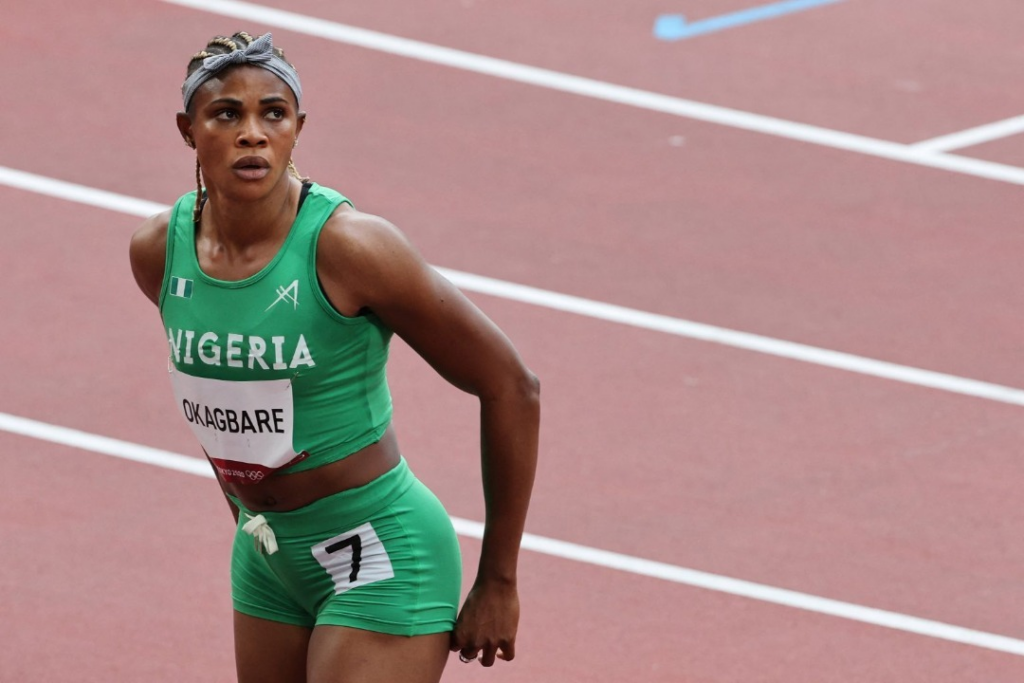Nigeria sprinter, Blessing Okagbare has been handed a 10-year ban by the Athletics Integrity Unit (AIU).
According to an AIU statement released on Friday, Okagbare was banned for five years for the presence and use of multiple prohibited substances and five years for her refusal to co-operate with the AIU’s investigation into her case.
Recall that the 33-year-old was expelled from the Tokyo Olympics last year before the women’s 100m semi-finals after testing positive for human growth hormone.
According to the statement, the AIU on October 7, 2021, pressed charges against the 2008 Olympics long jump silver medalist in relation to separate disciplinary matters.
“First, for the presence and use of multiple (two) prohibited substances (human Growth Hormone (hGH) and recombinant erythropoietin (EPO)) for which Ms Okagbare had been provisionally suspended on 31 July 2021, the day on which she had been scheduled to participate in the semi-finals of the Tokyo 2020 women’s 100m.
“Subsequently, in accordance with Rule 12 of the World Athletics Anti-Doping Rules, she was charged with a refusal to co-operate with the AIU’s investigation into her case.”
The AIU said that while a four-year ban was the maximum punishment for first-time doping offenders, Okagbare’s case attracted heavier punishment for “egregious conduct that amounted to aggravating circumstances”.
“The sole arbitrator adjudicating the case concluded that the athlete’s use of multiple prohibited substances as part of an organised doping regimen in the lead up to the Tokyo Olympic Games was egregious conduct that amounted to aggravating circumstances under the Rules thereby warranting an additional period of ineligibility on top of the standard four-year sanction.
The sole arbitrator also recognised the AIU’s right to carry out investigations, including the imaging of electronic devices, and to impose sanctions when an athlete refuses to co-operate with an investigation and thereby frustrates the AIU’s ability to fulfil its mandate to protect the integrity of the sport of athletics. In this instance, the sole arbitrator concluded that the athlete’s refusal to cooperate had denied the AIU the opportunity to discover evidence of possible further rule violations by her as well possible violations of the rules by others, for which he imposed an additional sanction of five years,” the statement read.
It quoted Head of AIU, Brett Clothier as saying, “We welcome the decision of the Disciplinary Tribunal; a ban of 10-year is a strong message against intentional and co-ordinated attempts to cheat at the very highest level of our sport. This is an outcome that was driven by our intelligence-led target testing as well as our commitment to investigate the circumstances behind a positive test.”
The AIU said that the athlete has the right to appeal against the Disciplinary Tribunal’s decision at the Court of Arbitration for Sport (CAS) within 30 days.
Since the announcement, Nigerians have taken to Twitter to express divergent opinions, with many describing the ban as a career-ending one.
Read comments below:
Blessing Okagbare 💔
— Mo-Mo💙 (@Morris_Monye) February 18, 2022
A 10 year ban for Blessing Okagbare for doping and failing to cooperate with officials?
In simple terms, her career is over!
— Wilfred Mong (@DsilentG) February 18, 2022
What a devastating news.
Blessing Okagbare 💔
10Yrs ban is def hanging of boot.
— Adewale Adetona (@iSlimfit) February 18, 2022
I feel very sad for Blessing Okagbare as she has been given a 10year ban. Our actions all have consequences whether we like it or not, by the time the ban is over her career might also be over.
Let's us all pounder on the things we do before we do them.#SelfActualization pic.twitter.com/oB3ySd8Ah5
— Bayelsa|Warri Twytter Queen 👑 (@BrayelaLayefa) February 18, 2022
This Blessing Okagbare story makes me so sad for her unfortunately 🤦🏽♂️
— Dami’ Adenuga (@DAMIADENUGA) February 18, 2022
Blessing Okagbare's 10 years ban is a career ending one. I feel pity for her cuz after 10 years she's almost a grandma 🥺🥺💔
— 🦅🦍Mayor of Yenagoa💐💜 (@NaughtyBoss_) February 18, 2022
The 10-year ban for Blessing Okagbare is pretty much a career-ending one. Truly sad 💔
— DREYLO (@RealDreylo) February 18, 2022

